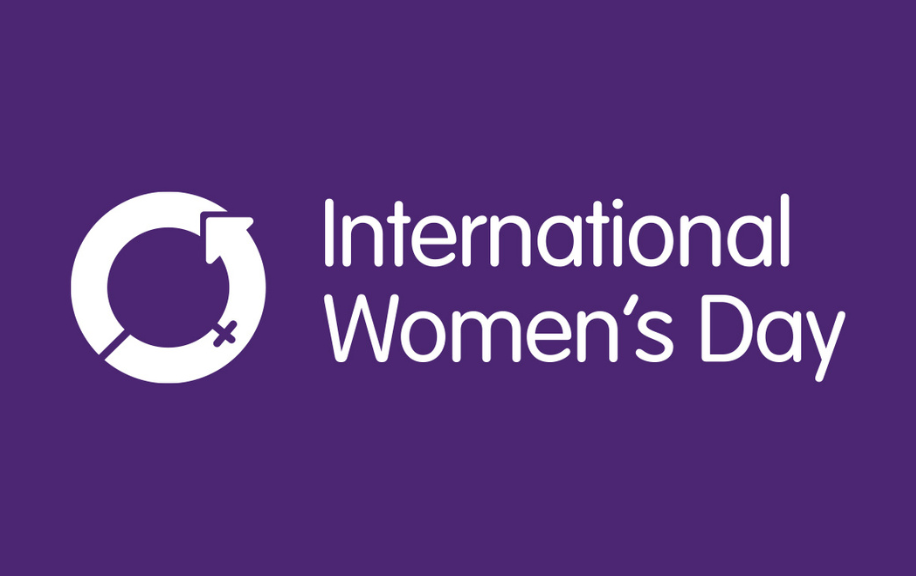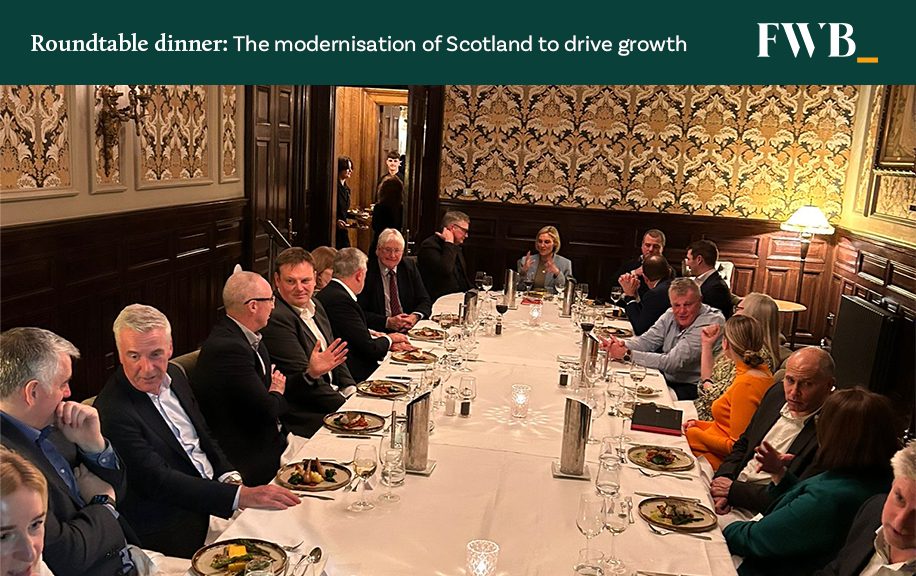Contact the team at FWB to discuss your individual or company requirements, or to discover more about our specialist services.
Reflections on the 2024 Scottish HR Leadership Group Conference
8 October 2024
- SHRLG
- FWB Events

Edinburgh Castle’s stunning backdrop set the stage for the 2024 Annual Scottish HR Leadership Group Conference, held at Brodies in Edinburgh last month. This year’s sold-out event was a remarkable gathering of industry leaders and HR professionals, showcasing the latest insights and strategies in contemporary leadership.
The conference, themed “Innovate to Elevate: HR’s Role in Shaping Tomorrow’s Workplace”, aimed to empower HR professionals with innovative and practical strategies for navigating the complexities of a modern work environment. It highlighted the crucial role HR leaders play in driving transformation through leadership excellence, evolving reward strategies, and adopting a skills-based approach to talent management. The programme featured three insightful sessions led by industry experts, each designed to provide fresh perspectives and actionable insights:
- Leadership 2.0: Strategies for a New Era
- Unlock Tomorrow’s Potential: Evolving Reward Strategies
- Beyond Titles: Hacking Skills First in HR
In addition to these sessions, the conference offered valuable networking opportunities, allowing attendees to connect, share best practices, and build lasting relationships.
Leadership 2.0: Strategies for a New Eea
The conference kicked off with the Leadership 2.0 session, featuring insights from Prof. Susan Elaine Murphy and Dr Susan Hetrick. Prof. Murphy emphasised the critical qualities that modern leaders must embody, including emotional intelligence and global awareness. She suggested that leaders engage in a personal SWOT analysis to clarify their purpose and align their development with organisational values. This approach fosters continuous learning through coaching and ensures that leaders understand the value they add to their companies.
Leader retention is increasingly linked to tailored reward and development strategies. Prof. Murphy noted that individualising development needs is becoming the norm, and leaders committed to continuous improvement are essential for organisational success. She also stressed the need for diverse leadership, highlighting examples such as female surgeons who have demonstrated better outcomes for their female patients.
Dr Hetrick added that while Forbes has highlighted various leaders, including Jeff Bezos and Elizabeth Holmes, not all exemplify effective leadership. She stated, “Humble disrupters as leaders can bring people along with them; they speak last to hear others’ views, and this works well.” She further emphasised the importance of diversity, saying, “We need to have more conversations about different types of leaders, and we need to look for more diversity in our leaders.” Dr Hetrick also noted, “Transparency is important. A compelling openness exists in Scotland, which is refreshing and positive.”
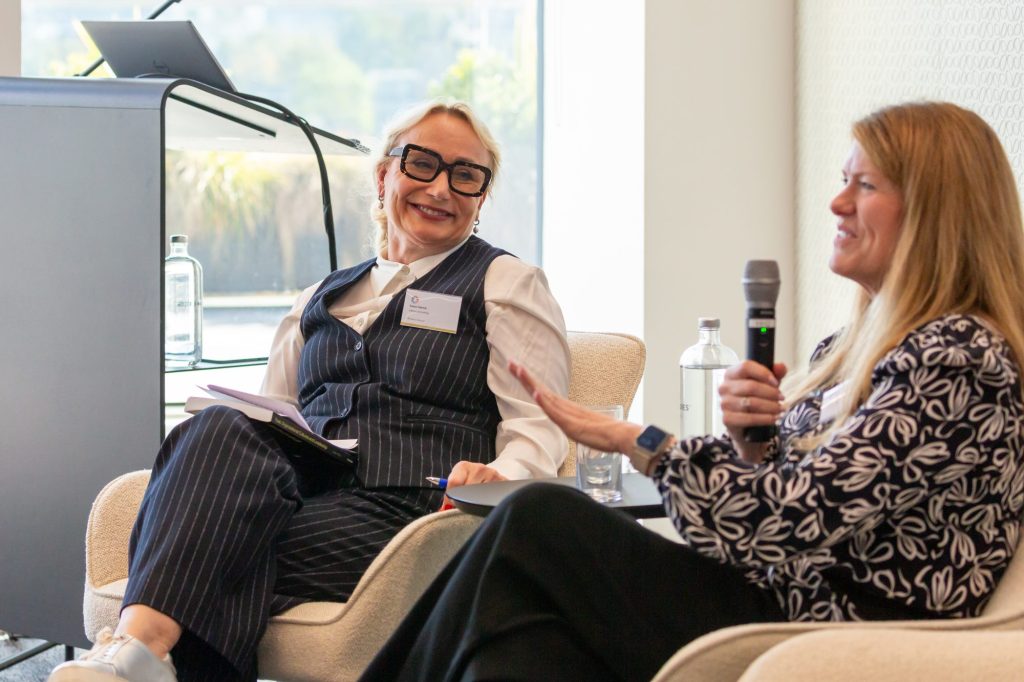
.
The session concluded with a lively Q&A discussion, during which participants explored various topics, including the importance of psychological safety within organisations and the need for agile leadership. Attendees discussed how leaders should balance people and productivity while being adaptable and the significance of providing early responsibility to emerging leaders, particularly from Gen Z.
Unlock Tomorrow’s Potential: Evolving Reward Strategies
The second session, ‘Evolving Reward Strategies’, focused on the evolving landscape of reward strategies considering recent global challenges. The session panel, including Hazel Cummings, Senior Reward Manager at PwC, Sharon Riddell, Director of Reward & Employment at NatWest Group, Alison Kidd, Partner at FIT Remuneration Consultants and chaired by Chris Paterson, Head of People Change & Delivery at Tesco Bank shared their insights, of which the key insights included:
.
- Adapt to New Expectations: The relationship between colleagues and employers has changed significantly due to the pandemic and the cost-of-living crisis, raising colleague expectations and complicating the design of effective reward strategies.
- Define Your Goals Clearly: It is crucial to understand the purpose behind each element of your reward strategy. Clearly defining goals ensures that reward interventions are tailored to effectively meet specific objectives.
- Keep It Simple: While detailed rules and rigid formulas can be tempting, simplicity is essential. A straightforward approach helps colleagues better understand their rewards and allows for greater agility in adapting to changing needs and business goals.
.
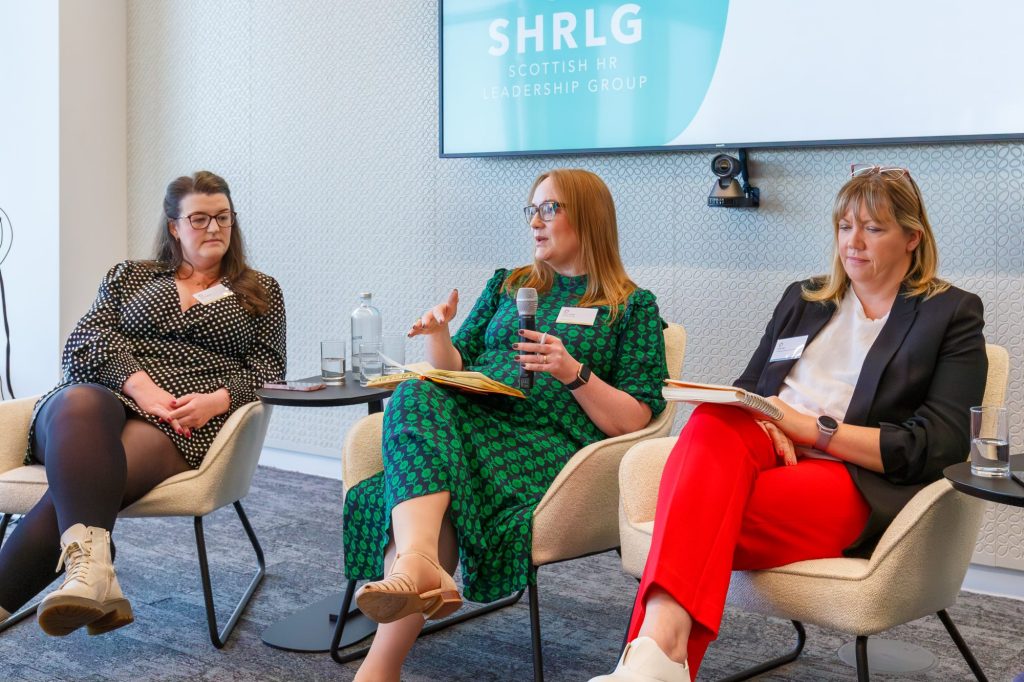
Beyond Titles: Hacking Skills First in HR
CIPD Market Analysis
Gordon Smith, Engagement Manager Scotland at CIPD, kicked off the third session on ‘Hacking Skills First in HR’ with a keynote address highlighting the pressing challenges faced by employers in the current job market. He shared insights from a recent CIPD survey revealing that 37% of employers are struggling with hard-to-fill vacancies, with the public sector experiencing the most significant difficulties. Notably, 20% of employers anticipate substantial challenges in filling these roles within the next six months, while 36% expect minor issues.
Despite these challenges, a striking 45% of UK employees feel that their skills are under-utilized in their current positions. This disconnect presents a unique opportunity for employers to rethink their strategies.
Gordon outlined several proactive measures that employers are considering to address these vacancies:
- Upskilling existing staff to better meet organizational needs.
- Raising wages to attract and retain talent.
- Increasing the duties of current employees to maximize productivity.
- Improving health and wellbeing policies, including enhanced occupational health support.
- Hiring more apprentices to build a skilled workforce from the ground up.
Gordon emphasised the importance of the CIPD Profession Map, which outlines the essential skills and behaviours required to excel as an HR professional. This framework not only facilitates skill transfer within and outside the sector but is also relevant for all levels and specialisms, extending beyond just CIPD members. Additionally, it includes links to a diagnostic tool to help professionals assess their competencies.
Cultivating Towards a Skills-Based Organisation
Stephen Findlay, Head of Organisational Development at Skills Development Scotland (SDS), then delivered a keynote focusing on ‘Cultivating Towards a Skills-Based Organisation’. Delegates were asked, “What has had the biggest impact on your organisation’s changing requirements for leaders and managers?” and the results then paved the direction of conversation across the rest of the session. The majority voted for changing workforce needs (including mental health, pay, and work-life balance), followed by working methods (flexibility and new team designs). The need for innovation (upskilling and creativity) came next, while AI and other technologies and pressure from increased competition received fewer votes, ranking fourth and fifth, respectively.
Stephen continued to engage delegates by asking how they would describe their organisation’s approach to a skills-based strategy. The results were:
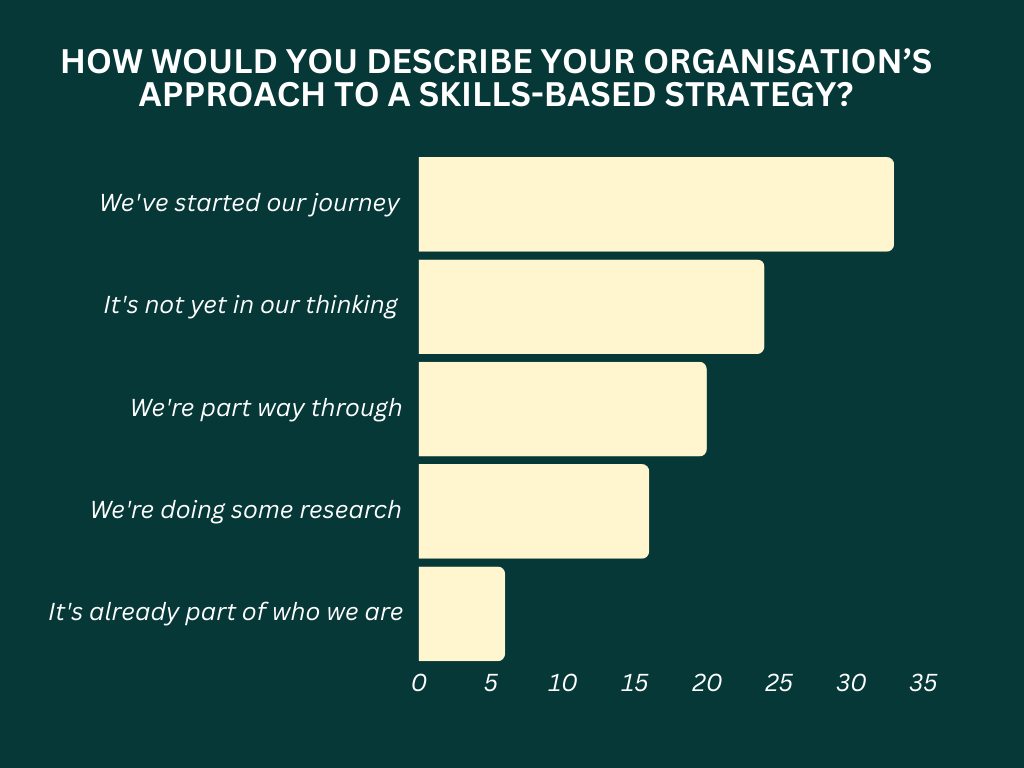
.
Stephen outlined several external drivers for transforming into a skills-based organisation:
- Life of a Skill: The average half-life of skills is now less than five years, with some fields as low as two and a half years. In five years, the current skill set of the SDS workforce will be worth about half as much as it is today.
- Occupational Change: Work is changing rapidly, and embracing a skills-first ethos will generate greater flexibility and a more inclusive culture.
- Inflationary Pressures: The public sector must rethink its approach to a sustainable workforce model.
- Agility of Workforce: Skills fuel agility, transformation, and resilience. One in three global organisations is accelerating towards skills-based models.
- Future Ready: A future-proofed skills ecosystem is essential for regularly assessing and reflecting on skills development.
.
Stephen emphasised that SDS must be agile, create flexibility in skill deployment, and retain a talent pipeline to thrive. The Skills First approach will enable this by fostering a culture of continuous learning, championing skills development, equipping managers and individuals with the right tools, and aligning talent management with organisational strategy.
He quoted Bhushan Sethi, Principal at PwC:
“A skills-first approach can deliver sustainable economic, business and societal outcomes. Accessing alternative talent pools to address today’s skills and labour shortages enables business model reinvention, fuels profitable growth, job creation, and more inclusive employment opportunities.”
He also referenced the World Economic Forum, which advocates for a new talent management approach emphasising skills and competencies over traditional credentials.
To reach this point, SDS undertook extensive research and consulted experts to define their vision: “The ambition is for SDS to transition to a skills-based organisation by defining and developing a ‘skills first’ approach to organising work and mobilising resources in an agile way, delivering workforce agility through skills development.”
Stephen outlined the approach to skills mapping, which involves exploring key questions to develop the most suitable solution for SDS:
1. How do we organise the occupational groupings?
2. What does a skills model/classification look like for SDS? How will this be recorded?
3. What role do meta-skills play?
4. How are the skills profiles made up? (i.e., core skills, meta-skills, technical skills, knowledge)
5. What does a robust self-assignment process look like?
6. What place does technology have within the approach?
7 How will the approach manage different levels of responsibility?
Stephen contrasted traditional and agile workforce models. The traditional workforce model is characterised by rigid structures, fixed roles and responsibilities, an over-reliance on governance, minimal innovation, and limited communication. In contrast, an agile workforce model promotes collaborative working, broader roles, flatter structures, integrated planning with streamlined governance, and embraces change and transformation through open communication.
He emphasised that becoming a skills-based organisation requires a shift in perspective from traditional role-based talent management to a focus on individual skill sets, assessing employees based on their skills rather than their job titles or histories.
Following Stephen and Gordon’s keynote presentations, the conference introduced a hackathon session. Delegates were challenged to design a skills-first profile for an HR generalist role in 2030. This interactive session aimed to leverage participants’ collective knowledge and creativity to envision the future of HR roles in a rapidly evolving workplace.
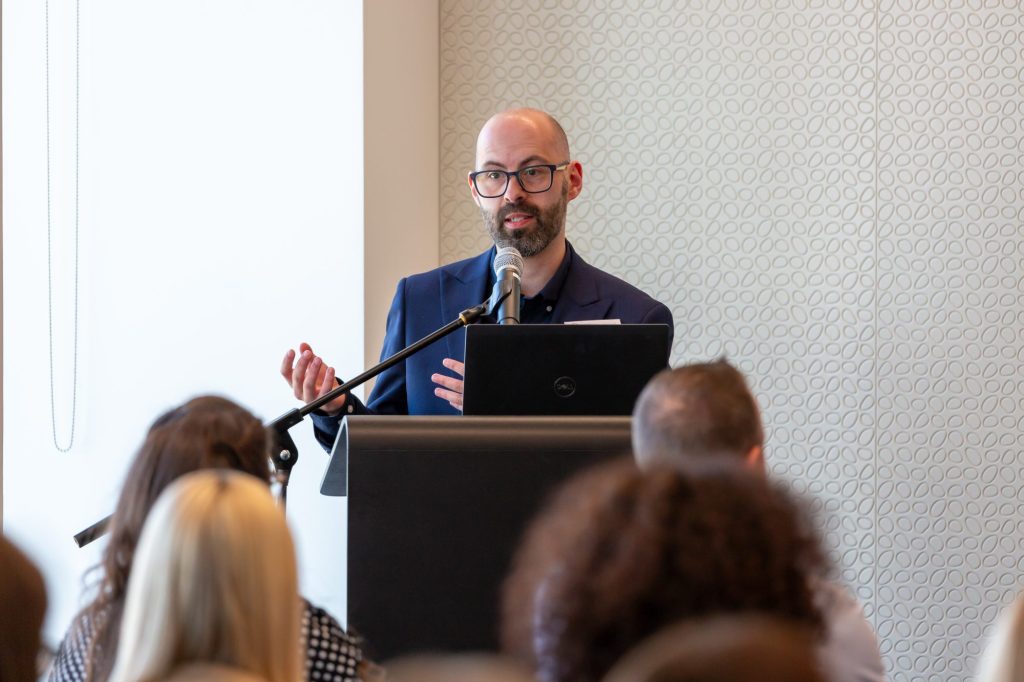
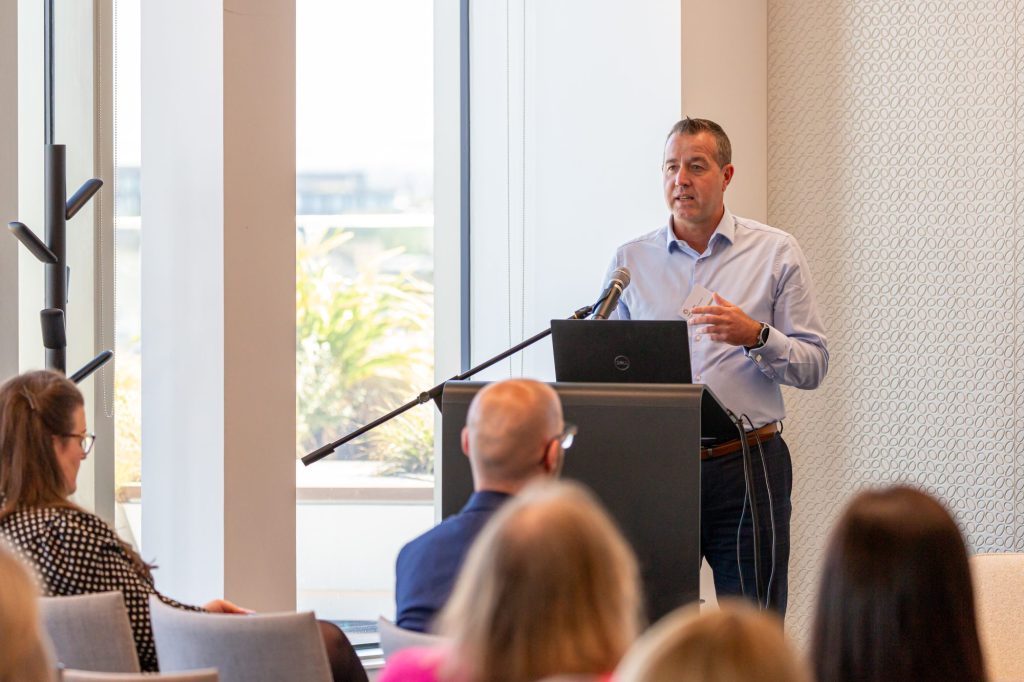
.
Throughout the conference, delegates interacted with speakers by submitting insightful questions, reflecting their concerns and interests in contemporary HR practices. Attendees sought insights on uncovering personal potential, the dynamics of confidence and humility in leadership, and strategies for improving workplace culture in the face of poor leadership traits. Many inquiries focused on achieving gender balance in traditionally male-dominated industries and the effectiveness of psychometric assessments in hiring. Delegates also expressed interest in the implications of agile leadership, the importance of psychological safety, and the evolving perceptions of leadership among younger generations. Additionally, questions addressed the role of recognition in corporate culture, the support for innovative reward strategies at the executive level, and how to nurture emerging leaders while appealing to a multi-generational workforce. These questions highlighted the pressing need for HR professionals to adapt to changing workplace dynamics and foster inclusive, effective leadership practices.
Get involved with the SHRLG
As we look to the future of HR and the evolving landscape of leadership, we invite all HR leaders and professionals to express their interest in joining the Scottish HR Leadership Group (SHRLG) network by following the SHRLG on LinkedIn; you can stay updated with insights from the Scottish HR community and learn about upcoming events organised by the SHRLG Operating Board.
Additionally, you can email info@scottishhrlg.com to express your interest in joining the SHRLG WhatsApp community, where you can connect with peers for real-time support and discussions. This email is also the perfect way to indicate your interest in attending future events, to be added to the mailing list managed by FWB, and to express your desire to participate in the SHRLG Conference in 2025.
Join us in shaping a more innovative, inclusive, and resilient workplace!


